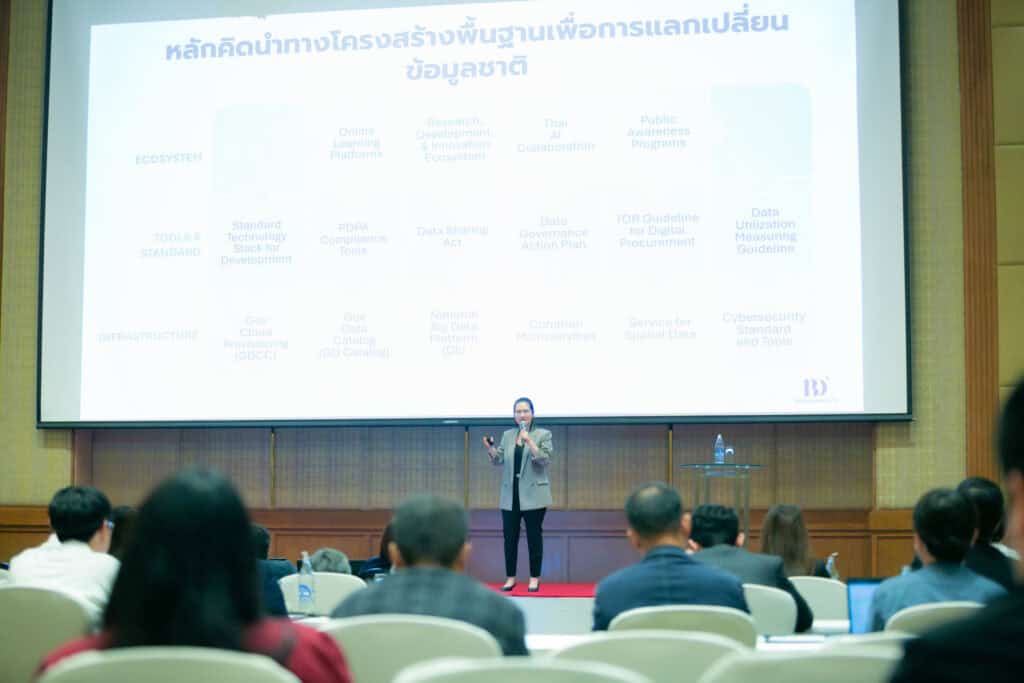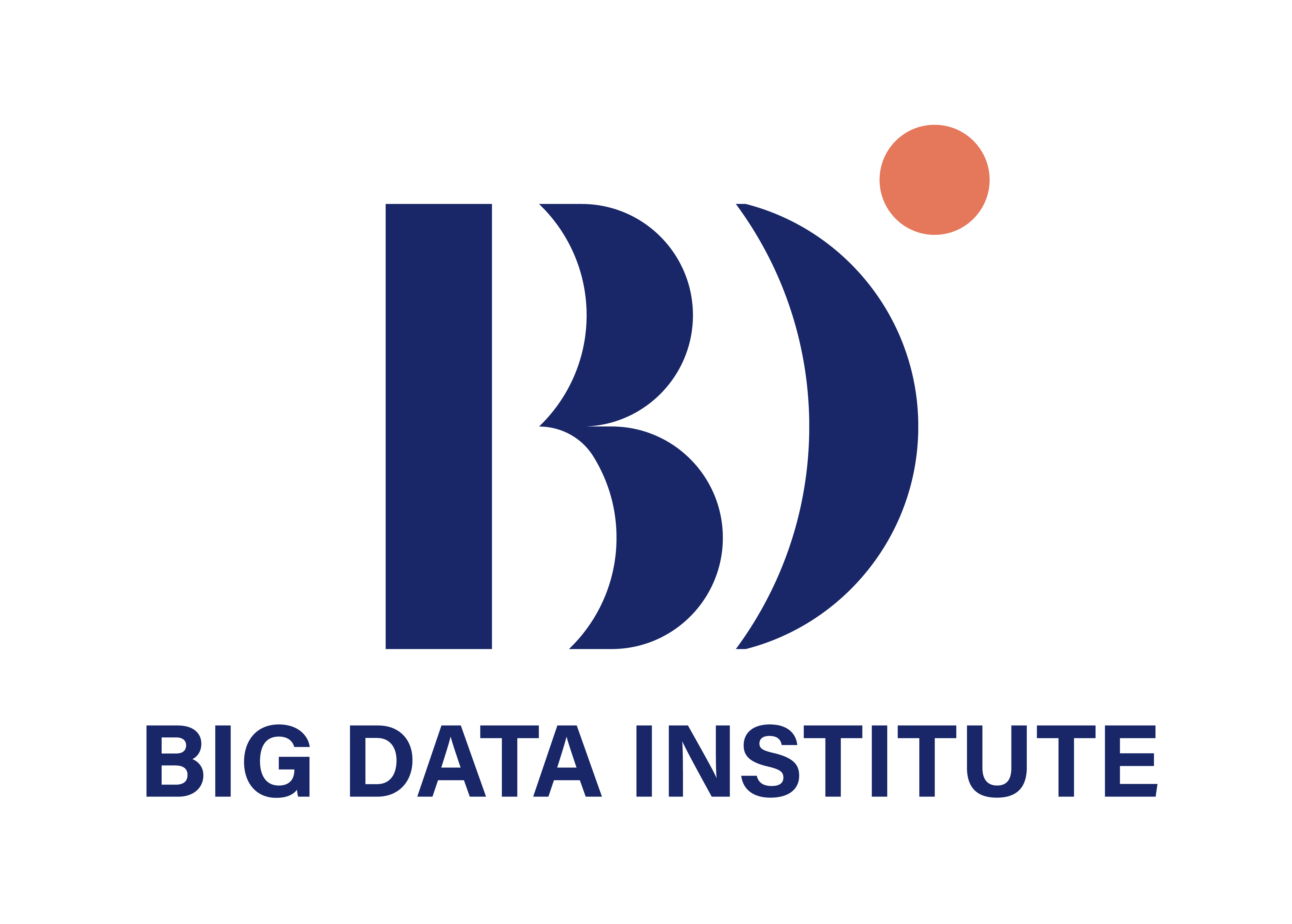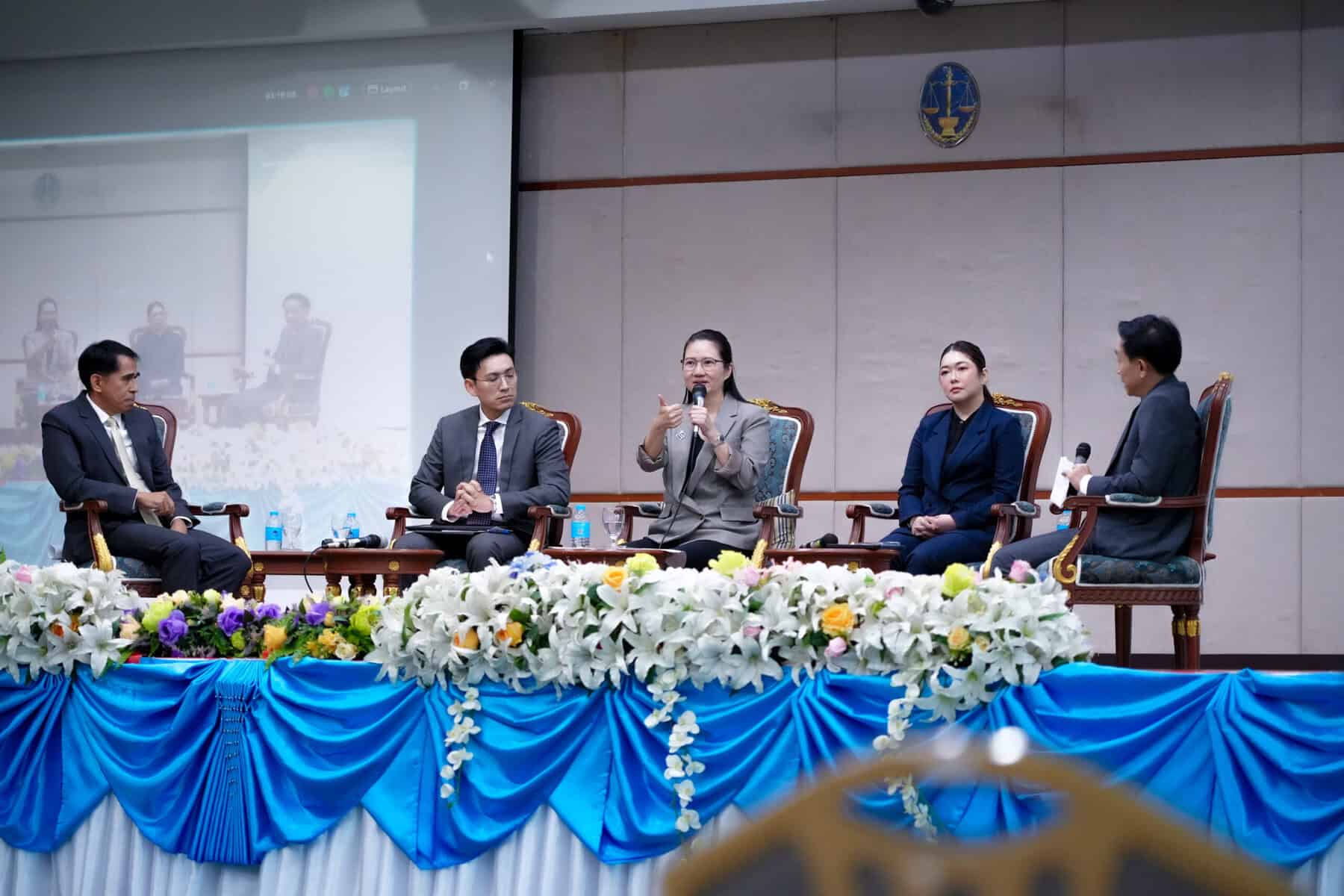25 เมษายน 2568, กรุงเทพฯ – สถาบันข้อมูลขนาดใหญ่ (องค์การมหาชน) หรือ BDI โดย รศ. ดร.ธีรณี อจลากุล ผู้อำนวยการสถาบันข้อมูลขนาดใหญ่ ร่วมบรรยายหัวข้อ “Making Thailand A Data-Driven Nation” ในงานสัมมนา “Navigating Thailand’s Sustainable Digital Future” ณ โรงแรม ดิ แอทธินี โฮเทล แบงค็อก จัดโดยสมาคมการจัดการธุรกิจแห่งประเทศไทย (TMA) ในฐานะที่ปรึกษาในการดำเนินโครงการสื่อสารเพื่อสนับสนุนการยกระดับความสามารถในการแข่งขันด้านดิจิทัลของประเทศไทย (Driving a Nation Towards World Digital Competitiveness) ของสำนักงานพัฒนาธุรกรรมทางอิเล็กทรอนิกส์ (สพธอ.) ซึ่งมีวัตถุประสงค์เพื่อสื่อสารสร้างการรับรู้และความเข้าใจ รวมถึงสร้างความร่วมมือกับหน่วยงานที่เกี่ยวข้อง ในการขับเคลื่อนยกระดับขีดความสามารถการแข่งขันด้านดิจิทัล (WDCR) ของประเทศ

รศ. ดร.ธีรณี กล่าวว่า BDI เป็นหน่วยงานในสังกัดกระทรวงดิจิทัลเพื่อเศรษฐกิจและสังคม (ดีอี) ดำเนินงานด้วยวิสัยทัศน์ “Data-Driven Nation” โดยมีภารกิจหลักในการขับเคลื่อนประเทศด้วยการเชื่อมโยง วิเคราะห์ และใช้ประโยชน์จากข้อมูลขนาดใหญ่เพื่อพัฒนาเศรษฐกิจและสังคม ผ่าน 3 ภารกิจหลัก ประกอบด้วย 1. B.I.G.: Big Data Integration and Governance ประสานและเชื่อมโยงข้อมูลจากหน่วยงานต่าง ๆ เพื่อใช้ประโยชน์ในเชิงวิเคราะห์ รวมทั้งให้บริการการวิเคราะห์ข้อมูลตามโจทย์ความต้องการของหน่วยรับบริการ โดยกว่า 80% ของเจ้าหน้าที่ทั้งหมดเป็น Data Scientist, Data Engineer และ AI Engineer จะขับเคลื่อนภารกิจนี้เป็นหลัก ซึ่งเป้าหมายแรกของปี 2568 คือ การพัฒนา National Big Data Platform รวบรวมและเชื่อมโยงข้อมูลของภาครัฐเข้าด้วยกัน เพื่อใช้ในการวิเคราะห์ข้อมูลและการออกแบบนโยบายของภาครัฐ โดย BDI ทำหน้าที่สร้าง “ถนน” สำหรับข้อมูล เพื่อให้บริการเมื่อหน่วยงานใดต้องการใช้ข้อมูลก็สามารถ “เปิดประตู” เพื่อดึงข้อมูลออกมาใช้ตามสิทธิ์ที่กำหนด

2. BRIDGE เชื่อมโยงผู้ประกอบการเทคโนโลยี และนวัตกรรมด้านข้อมูล เป้าหมายที่สองของปี 2568 คือ การขับเคลื่อนประเทศไทยด้วย Open Source AI เพื่อเป็นแนวทางในการพัฒนานวัตกรรม โดยเฉพาะภาครัฐควรมีแพลตฟอร์ม AI แบบโอเพนซอร์สของตัวเอง ผ่านโครงการพัฒนาโมเดลภาษาขนาดใหญ่ (Large Language Model) สำหรับภาษาไทย (ThaiLLM) เพราะเชื่อว่าการพัฒนาโมเดล AI ควรคำนึงถึงอธิปไตยทางข้อมูล หากประเทศไทยต้องการ Chatbot อัจฉริยะหรือระบบ Smart Search ที่เหมาะสมกับคนไทย เราจำเป็นต้องใช้ข้อมูลที่สะท้อนถึงภาษา วัฒนธรรม และภูมิภาคของไทย รัฐบาลเป็นผู้ลงทุนเริ่มต้นเพื่อให้สามารถเปิดเป็นโอเพนซอร์ส ทำให้ธุรกิจ SME และ Startup สามารถนำไปพัฒนาต่อยอดได้โดยมีต้นทุนที่ต่ำลง

และ 3. BUILD พัฒนาทักษะความรู้ด้านการวิเคราะห์ข้อมูล เป้าหมายที่สามของปี 2568 ด้วยการสร้างหลักสูตรที่สามารถเรียนรู้ได้แบบออนไลน์ผ่าน Micro-Credential เพราะ AI ไม่ได้เป็นเรื่องเฉพาะของวิศวกรคอมพิวเตอร์อีกต่อไป หลายมหาวิทยาลัยเริ่มเปิดคณะปัญญาประดิษฐ์ เพื่อรองรับนักศึกษาจากหลากหลายสาขา ทาง BDI จึงทำงานร่วมกับเครือข่ายมหาวิทยาลัย เพื่อสร้างหลักสูตรพื้นฐานร่วมกัน สามารถนำไปประกอบเป็นหลักสูตรเฉพาะสำหรับอาชีพต่าง ๆ ได้ เพื่อพัฒนาทักษะบุคลากรด้าน AI และ Data Science เสริมแกร่งให้กับประเทศไทยต่อไป

Public Relations and Communication Specialist
Big Data Institute (Public Organization), BDI
- Narisara Boonsrihttps://temp.bdi.or.th/en/author/narisara-bo/
- Narisara Boonsrihttps://temp.bdi.or.th/en/author/narisara-bo/
- Narisara Boonsrihttps://temp.bdi.or.th/en/author/narisara-bo/
- Narisara Boonsrihttps://temp.bdi.or.th/en/author/narisara-bo/












